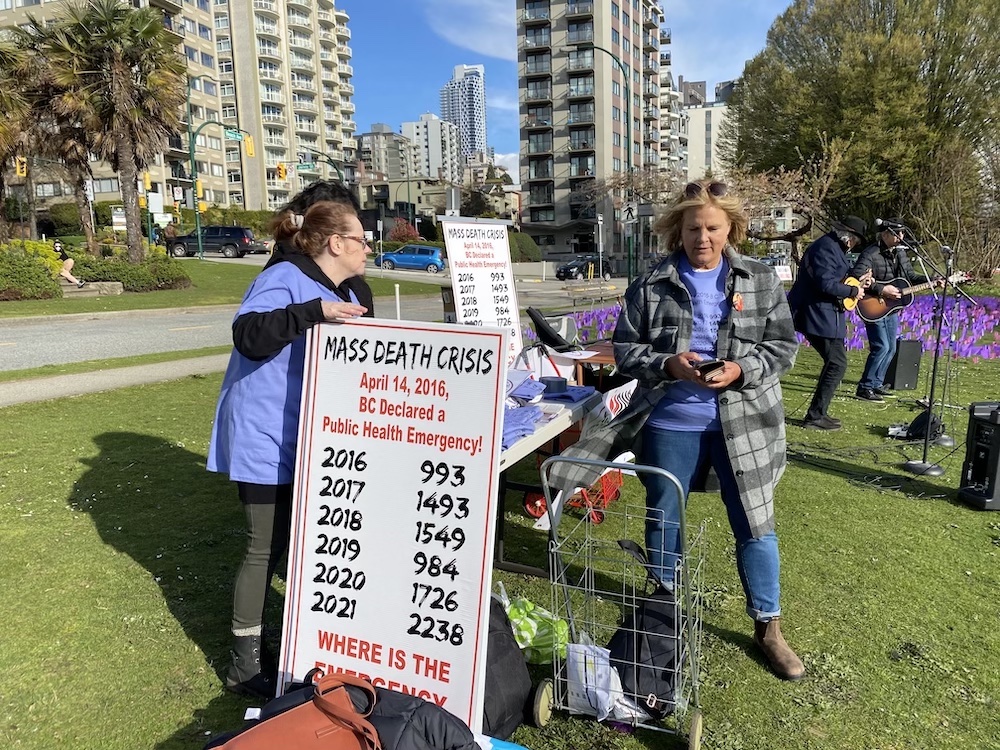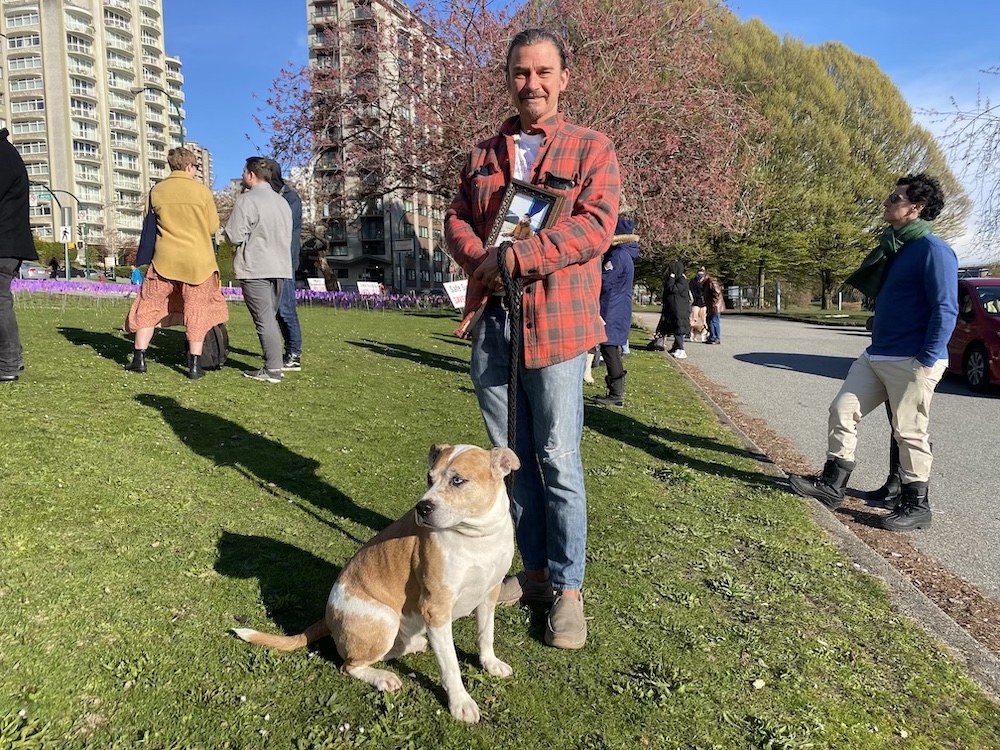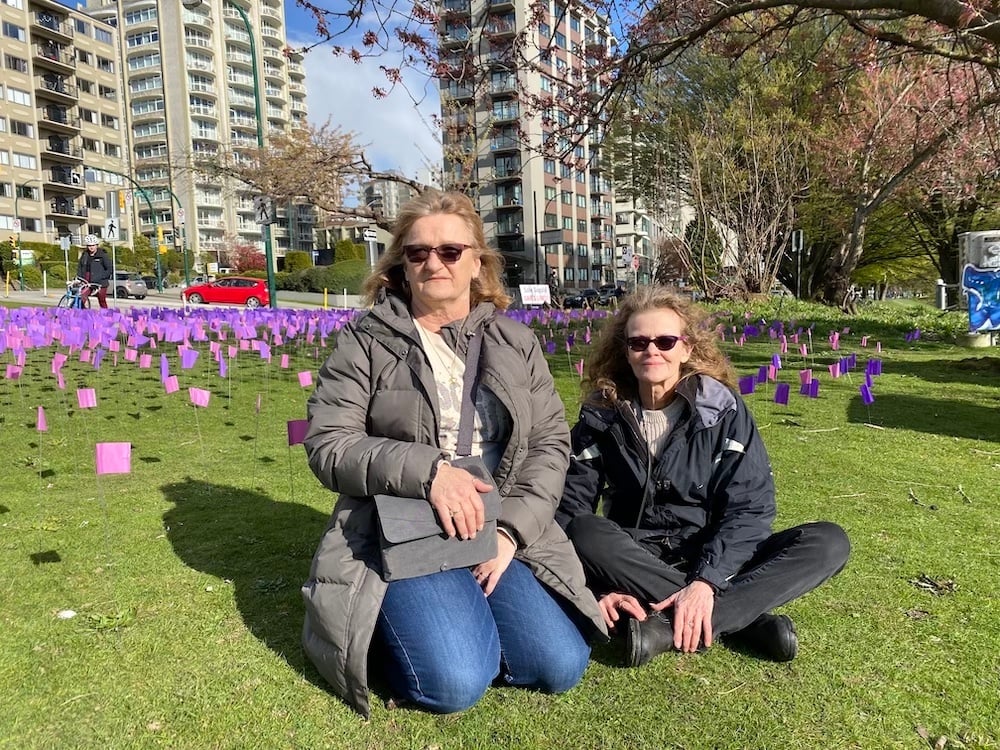Debbie Lachapelle sometimes drives around Vancouver’s West End near English Bay, looking for her daughter among the tree-lined streets and rows of aging apartment blocks.
Erika Paige Lachapelle died almost a year ago on April 25. She was 29 and fell 12 stories from her apartment balcony. Her death was ruled a suicide, but Lachapelle believes her daughter overdosed and either fell or was pushed.
Erika had been introduced to substance use that year. And then she was gone.
“I feel empty, numb, lonely. I miss her,” Lachapelle, a single mother, said in Sunset Beach Park. “It was me and her.”
“I lost my future. I’ll never be a grandmother. I’ll never have a son-in-law.”
On Thursday, Lachapelle returned to English Bay with others to mourn the dead and demand action on the sixth anniversary of the overdose public health emergency in British Columbia.
The gathering of about 40 people organized by the advocacy group Moms Stop the Harm represents just a small fraction of the bereaved left behind by the more than 9,400 people who have been killed by toxic drugs since 2016.
“Everyone here knows exactly what it feels like,” Lachapelle said.
Now in its seventh year, B.C.’s oldest public health emergency is claiming more lives than ever, with drugs that are becoming increasingly toxic, potent and unpredictable.
At least 2,232 people died of drug poisonings last year. The per capita death toll has more than doubled to 43.5 deaths per 100,000 since 2016.
Last year, on the fifth anniversary of the public health emergency, the B.C. government announced it would ask Ottawa permission to decriminalize personal possession of drugs in the province.
The submission is still being considered, and other promised efforts to separate people from the toxic drug supply, such as safe supply, have stalled.
"Our hearts go out to those affected by the toxic drug crisis,” read a Thursday statement from Premier John Horgan, Minister for Mental Health and Addictions Sheila Malcolmson and provincial health officer Dr. Bonnie Henry.
“This is an anniversary that cannot continue. We need to come together to protect British Columbians now and into the future. While we are making progress, we know there is much more to do.”

A recent report from a panel of experts convened by the chief coroner found the government had failed to act in an urgent, co-ordinated and accountable way to respond to the crisis.
It urged action to replace the poisoned supply in order to save lives while other resources scaled up.
"Much greater access to safer supply across the province is critical to preventing future loss of life,” said chief coroner Lisa Lapointe in a Thursday statement. “This, alongside decriminalization of possession for personal use, greater access to evidence-based treatment and care, and a continuum of services that meets people where they are, will support those at risk and provide a path out of this crisis."
Moms Stop the Harm board member Traci Letts said in the last two years the organization’s membership has doubled to more than 3,300 people across Canada. About half of those members are in B.C.
“I never thought I would see the deaths compile like they have in six years,” said Letts, whose son has dealt with substance use issues for more than a decade. She joined the organization in 2018.
“We thought safe supply was on the horizon, but it’s been a dismal failure, no one can get it in B.C.”

As harm reduction volunteers from Street Saviours Outreach Society trained attendees to use naloxone to reverse an opioid overdose, mourning loved ones stood shoulder to shoulder. A field of tiny purple flags in the ground flapped in the wind, each representing a life lost to toxic drugs.
Matthew Witt stood back from the crowd. Witt’s son, Sebastian Witt, died of a fentanyl poisoning on May 18, 2015, at age 20. He had relapsed after a year in recovery from opioid addiction.
Witt has been grieving his son’s life for the entire span of the public health emergency.
“The grief changes but it never goes away. It comes and goes,” Witt said, standing with his son’s rescue dog, Rio.
Lachapelle feels the health-care system failed Erika, who was hospitalized 12 times in the nine months before her death. Lachapelle herself at one point revived her from an overdose.
She wants more to be done so no more parents bury their children like she had to.
“I just hope there aren’t so many more deaths,” said Lachapelle. “And I hope that I’ll meet her again one day.” ![]()
Read more: Health, Rights + Justice
















Tyee Commenting Guidelines
Comments that violate guidelines risk being deleted, and violations may result in a temporary or permanent user ban. Maintain the spirit of good conversation to stay in the discussion.
*Please note The Tyee is not a forum for spreading misinformation about COVID-19, denying its existence or minimizing its risk to public health.
Do:
Do not: